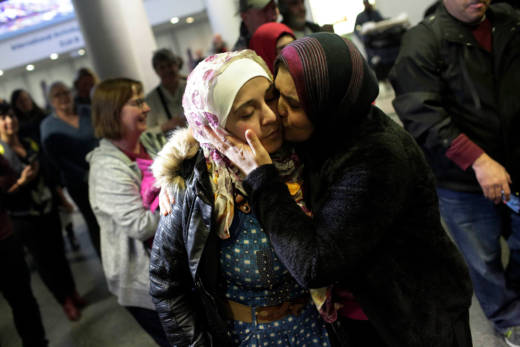Trump's executive order does not list the 11 countries.
U.S. State Department officials said in an emailed statement earlier Tuesday that federal agencies had “conducted a review to further intensify the screening process of individuals seeking admission as refugees to uphold the safety of the American people.”
Trump's order reiterated this theme, stating it is the policy of the United States to protect its people from terrorism and other public safety threats and that screening and vetting of foreigners entering the country "play a critical role in implementing that policy."
The suspension of refugee entries was originally part of Trump’s travel ban first announced in January, and revised in March following legal challenges. The revised ban, which targeted travelers from six Muslim-majority countries along with refugees, was also challenged.
In June, the U.S. Supreme Court allowed the travel ban to move forward but said that it could not be applied to people who had “a credible claim of bona fide relationship" with a person or entity in the United States, like immediate family or a job. An appeals court ruled in September that ties to family members like grandparents or cousins would also count as qualifying relationships.
The rules were applied this summer to refugees, who were not allowed to use their relationship with a U.S. resettlement agency as a qualifying U.S. tie.
Under the travel ban, those from the six Muslim-majority countries -- Iran, Libya, Somalia, Sudan, Syria and Yemen -- were also required to prove close family or other U.S. ties. Those rules expired late last month, when the Trump administration announced a similar set of country-specific restrictions. These were set to take effect last week, but were blocked by two federal courts and are now on hold.
One part of the latest travel ban affecting North Korea and Venezuela remains in effect.
On Tuesday, refugee resettlement agencies said the vetting process for refugees is already stringent, and can take from a year and a half to several years, depending on the case.
"The vetting process for refugee resettlement involves up to, like, six different agencies," said Jose Serrano with World Relief, a refugee resettlement agency with offices in Garden Grove. "Counter-terrorism organizations, Department of Homeland Security, CBP, FBI, Department of Justice. And even Syrians go through a sixth one. So the truth is refugees already go through a very in-depth screening."
But those who don't want more refugees in the United States support the idea of longer wait times and more background checks for applicants.
"The waits are long, but if they turn out to be slightly longer, well then, that's just something that will have to happen in exchange for the more secure processing of refugees," said Joe Guzzardi with Californians for Population Stabilization, an immigration restriction group.
The Trump administration recently announced that the fiscal year 2018 ceiling for refugee admissions to the U.S. has been set at 45,000, the lowest number in years. The Obama administration set a cap of 110,000 last year, a number that was halved after Trump took office.
